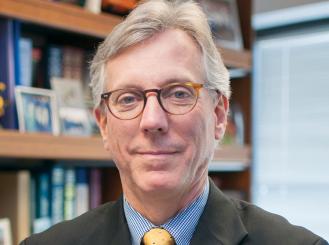May 18, 2017
In the following video and transcript, 2016-2017 ASCO President Daniel F. Hayes, MD, FACP, FASCO, shares insights on the theme he selected for his presidential term and the 2017 ASCO Annual Meeting. The transcript has been edited slightly for style and clarity.
My Annual Meeting theme this year is “ASCO: Making a Difference in Cancer Care WITH YOU.” (I've capitalized the “with”!)
One of the great strengths of the organization is that we cover every aspect of helping caregivers—not just doctors, but caregivers who take better care of patients with or at risk for cancer. I'm very proud of that, whether through education, science, or improving quality of care. In the middle of all that is a patient with cancer, and everything feeds into that.
ASCO Is the Inclusive Society Providing Benefits Directed Towards a Singular Focus: Better Care for Patients at Risk for or With Cancer
ASCO's not in this alone. Cancer is an equal opportunity disease, unfortunately. It affects people regardless of their walk of life, their job, where they live, or anything else. We recognize that cancer needs to be treated with a multidisciplinary approach. That means the therapies need to be multidisciplinary.
We've really made an effort to reach out to our colleagues in surgery, our colleagues in radiation oncology. (In fact, we have designated spots on the Board of Directors for surgeons and radiation oncologists.) We've reached out to the folks who take care of people with cancer who don’t necessarily have an MD or a DO after their name, especially the nurse practitioners and physician assistants. Increasingly, they are folks who help us take better care of patients with cancer.
ASCO has made a real effort to reach out to the next generation of cancer care professionals. We're thinking about ways we can begin to show them why oncology is actually fun, why oncology is exciting, why it's rewarding. The Leadership Development Program [LDP] started a decade ago, and we now have two graduates of the LDP on the Board of Directors. It won't be at all a surprise to me to see a graduate of the LDP be a president of this Society in the next 5 years.
ASCO Knows What Is Important to Its Members and Is Working to Meet Their Needs
I learned medicine very differently than my son, who's just become a doctor, and that's because the younger generation learns in a way that's completely different than I did. People who are physicians in Africa, Asia, Australia, learn differently than we do [in North America]. Radiation oncologists need to know different things than we do [as medical oncologists]. So, we're going to revamp our education programs in many ways.
We're now beginning to think about what we can do for research, above and beyond just delivering your abstract results at the ASCO Annual Meeting. One way we've done that is by advocating for increased funding for clinical research. We're on Capitol Hill. We're advocating very strongly. This is not a Republican, a Democrat, or an Independent issue. It's an everybody issue—we've all got family members, loved ones, friends who have had cancer, died of it.
We need to be sure that we keep young people in the research game. Advocacy is one way. The second way is that we ourselves have funded research. Our foundation, the Conquer Cancer Foundation, has poured millions of dollars, hundreds of millions of dollars into funding prospective research done by our members, mostly for our young members. If we can keep them in the game with our YIAs and our CDAs—Young Investigator Awards and Career Development Awards—just for a year or two, that's all it takes.
We're working with CMS quite closely with the quality payment programs that they're developing, to be sure that they are practical and applicable to our practices in oncology. They've listened; we're very proud of that. We're also trying to then help our physicians understand the quality payment programs, understand MACRA, embrace them, and adopt them into their own practice.
Thinking Outside the Box to Help Provide Better Care for Patients With Cancer
What makes ASCO innovative? How do we stand up next to other organizations or to ourselves in the past? We've had long talks about this on the Board of Directors. I and the other leaders of ASCO feel very strongly that most organizations don't stay the same. You either get better or you get worse, and if you stay the same, you're probably going to get worse. We've been trying to think of a variety of ways to be innovative, and this goes back 15, 20 years. We've made a real effort to be more innovative and aggressive about reaching out to the needs of our members who are in community practice, or even in academic practice. It doesn’t matter. We all take care of patients.
CancerLinQ® is a really important initiative on our part. Could we develop a rapid learning system that would improve the quality of care for our patients? Then that database could be used for several things. Most importantly, to feed back to those physicians how well they're doing in regards to their peers, how well they're doing in regards to establish guidelines and pathways, so that they could improve their own practices.
Conclusion
Being ASCO president has been an incredible experience. It's one of the great experiences of my professional life. Especially this year, I've gotten to travel around the country and around the world and see how much ASCO means to people in terms of their practices, how much ASCO means to patients. Many patients don’t even know what it is, but I can see what we do that affects how they do, and that's what we're trying to do.

